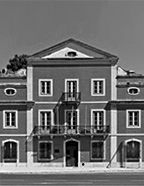

................................
Historiography
I
This was clearly a priority trend to historians of the APH such as Merêa and Caetano. Also, economic history began to appear in the Academy, through the writings of Virgínia Rau and João Albino Ferreira. However, these divergent trends should not be seen as the rule in the Academy. Most of the works continued to be more conservative in historiographical terms. Even recurring themes that were not so hegemonic, such as historiography and historians' memory – especially visible in the works of António Baião on Alexandre Herculano – were focused on great men, without innovative methodologies and reasonably detached from the theoretical developments of the decades between 1940 tand 1970 (histoire sérielle, begriffsgeschichte, etc.). For the purpose of constructing a nationalist historiography, Portugal was not technically lagging behind. However, for the purpose of an erudite historiography, the opposite was observed, as the Academy was losing contact with the international university milieu.
The works presented at the Academy continued to be of an individual nature, and collective undertakings ultimately failed to thrive. At the same time, in 1954, António Baião returned to the vice-presidency of the Academy, with Marcelo as 2nd vice-president. In the subsequent election, three years later, Laranjo Coelho would replace Marcelo. A conflict was beginning to emerge between those who viewed the APH as an institution for erudite and modern research, and those who believed that the Academy was well-established and could continue its work as usual.
Attempts were made to counter this trend, such as the election of Silva Rêgo and Manuel Heleno as vice-presidents of the Council in 1963 and, more importantly, a presentation in the same year by Joaquim Veríssimo Serrão on the possibility of a New History of Portugal, where he advocated once again for a history developed collectively and scientifically, not only in the processing of documents but also in the use of all the possible auxiliary sciences. However, the Academy would not substantially change course until 1974. With decreasing funds, as its budget had not been significantly increased for decades, the Academy lost its more innovative features (collaborative and critical work) and solidified its more traditional aspects – documentary tradition, commemoration, and patriotism, continuing to produce a historiography that theoretically fell within the scope of the methodic school, on the one hand, and a focus on historical events on the other, albeit with significant exceptions. Even in a final effort to publish an academic and erudite history of Portugal, the APH did not raise sufficient funding and commissioned Veríssimo Serrão to write a monographic history, which went against the desideratum of collaborative work, not to mention the opinion expressed by the author himself (Serrão, “Nova ‘História de Portugal’”, Anais II vol. 13, 111-137 ["New 'History of Portugal'", Annals II vol. 13, 111-137]). The Portuguese Academy of History had become a place that merely reflected national efforts, instead of leading them. The University in Portugal went on to take that place. The epitome of this fact would be the promotion of João Ameal and Costa Brochado to full members in the late 1960s.
